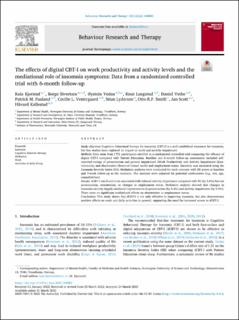| dc.contributor.author | Kjørstad, Kaia | |
| dc.contributor.author | Sivertsen, Børge | |
| dc.contributor.author | Vedaa, Øystein | |
| dc.contributor.author | Langsrud, Knut | |
| dc.contributor.author | Vethe, Daniel | |
| dc.contributor.author | Faaland, Patrick | |
| dc.contributor.author | Vestergaard, Cecilie | |
| dc.contributor.author | Lydersen, Stian | |
| dc.contributor.author | Smith, Otto Robert Frans | |
| dc.contributor.author | Scott, Janine Linda | |
| dc.contributor.author | Kallestad, Håvard | |
| dc.date.accessioned | 2023-04-28T11:14:43Z | |
| dc.date.available | 2023-04-28T11:14:43Z | |
| dc.date.created | 2022-10-11T14:30:15Z | |
| dc.date.issued | 2022 | |
| dc.identifier.citation | Behaviour Research and Therapy. 2022, 153 1-7. | |
| dc.identifier.issn | 0005-7967 | |
| dc.identifier.uri | https://hdl.handle.net/11250/3065518 | |
| dc.description.abstract | Abstract Study objectives Cognitive behavioral therapy for insomnia (CBT-I) is a well-established treatment for insomnia, but few studies have explored its impact on work and activity impairment. Methods Data stem from 1721 participants enrolled in a randomized controlled trial comparing the efficacy of digital CBT-I compared with Patient Education. Baseline and 6-month follow-up assessments included self-reported ratings of presenteeism and general impairment (Work Productivity and Activity Impairment Questionnaire), and absenteeism (hours of missed work) and employment status. Insomnia was measured using the Insomnia Severity Index (ISI). Mediation analyses were conducted for each outcome with ISI scores at baseline and 9-week follow-up as the mediator. The analyses were adjusted for potential confounders (e.g., sex, age, comorbidities). Results dCBT-I was found to be associated with reduced activity impairment compared with PE (by 5.6%) but not presenteeism, absenteeism, or changes in employment status. Mediation analysis showed that changes in insomnia severity largely mediated improvements in presenteeism (by 5.4%) and activity impairment (by 5.5%). There were no significant mediational effects on absenteeism or employment status. Conclusions This study shows that dCBT-I is not only effective in improving insomnia. But also demonstrates positive effects on work and daily activities in general, supporting the need for increased access to dCBT-I. | |
| dc.description.abstract | The effects of digital CBT-I on work productivity and activity levels and the mediational role of insomnia symptoms: Data from a randomized controlled trial with 6-month follow-up | |
| dc.language.iso | eng | |
| dc.title | The effects of digital CBT-I on work productivity and activity levels and the mediational role of insomnia symptoms: Data from a randomized controlled trial with 6-month follow-up | |
| dc.title.alternative | The effects of digital CBT-I on work productivity and activity levels and the mediational role of insomnia symptoms: Data from a randomized controlled trial with 6-month follow-up | |
| dc.type | Peer reviewed | |
| dc.type | Journal article | |
| dc.description.version | publishedVersion | |
| dc.source.pagenumber | 1-7 | |
| dc.source.volume | 153 | |
| dc.source.journal | Behaviour Research and Therapy | |
| dc.identifier.doi | 10.1016/j.brat.2022.104083 | |
| dc.identifier.cristin | 2060534 | |
| dc.relation.project | Norges forskningsråd: 239985 | |
| dc.relation.project | Samarbeidsorganet mellom Helse Midt-Norge og NTNU: 90061500 | |
| dc.relation.project | Stiftelsen Dam: 2018/FO198760 | |
| cristin.ispublished | true | |
| cristin.fulltext | original | |
| cristin.qualitycode | 2 | |
